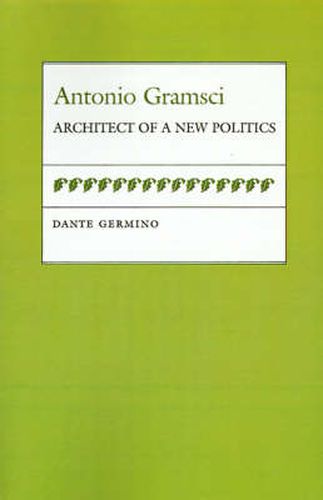Antonio Gramsci: Architect of a New Politics
Dante Germino

Antonio Gramsci: Architect of a New Politics
Dante Germino
This title is printed to order. This book may have been self-published. If so, we cannot guarantee the quality of the content. In the main most books will have gone through the editing process however some may not. We therefore suggest that you be aware of this before ordering this book. If in doubt check either the author or publisher’s details as we are unable to accept any returns unless they are faulty. Please contact us if you have any questions.
Dante Germino’s biography of the Italian communist and political theorist Antonio Gramsci offers a major reassessment of this important twentieth-century thinker. Germino analyses Gramsci’s remarkable life as well as his extensive oeuvre, from the early Turin articles to the meditative Prison Notebooks.
Gramsci saw society as composed of a small but powerful political center and a large body of emarginati, marginalized people at the periphery of society who are denied access to traditional positions of power. That vision led Gramsci to concentrate on the significance of the
common man
as he developed his theory of the political organisation of society. The persistent theme in Gramsci’s work is how the ordinary man thinks, feels, and endures, and how the course of political institutions is shaped by the efforts of the marginalized to erode the boundaries of the center. Gramsci’s approach is perhaps best expressed as a reunion of philosophy and experience and a revaluation of the quotidian.
Gramsci’s new politics of inclusion anticipated by well over a half-century the recent epoch-making developments in the USSR and in Eastern Europe. His antiauthoritarian leadership style as secretary of the Italian Communist party in the 1920s prefigured Gorbachev’s policies of perestroika and glasnost. Gramsci’s insistence on the international Communist movement’s openness to new social formations at the grass roots is supremely relevant to developments in Romania, Czechoslovakia, East Germany, and Poland, where forces hitherto kept at the margins of political life by ossified Communist-party structures have burst on the scene with unprecedented vitality.
Gramsci refused to revere Marx as a
shepherd with a crook.
Equating history with the
rhythm of liberty,
he emerges as a prophetic voice in the desert of a bureaucratic and dogmatic communism. The dramatic recent changes in the Italian Communist party under Achille Ochetto also owe their ultimate inspiration to this diminutive, hunchbacked theorist-practitioner from Italy’s periphery.
Germino’s compelling study of Gramsci’s personal life and intellectual development offers fresh insights into Gramsci’s work that will be of interest to all students of cultural and political theory. Of particular interest is his extensive consideration of the preprison writings both in their own right and for the light they cast on the Prison Notebooks.
This item is not currently in-stock. It can be ordered online and is expected to ship in 7-14 days
Our stock data is updated periodically, and availability may change throughout the day for in-demand items. Please call the relevant shop for the most current stock information. Prices are subject to change without notice.
Sign in or become a Readings Member to add this title to a wishlist.


